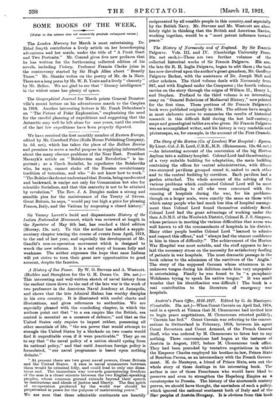The Story of the Horton (Co. of London) War Hospital
: Epsom. By Lieut. -Col. J. R. Lord, C.B.E., M.B. (Heinemann. 12s. 6d. net. ) An interesting account of the conversion of the big Horton Asylum into a military hospital. Colonel Lord had theadvantage of a very suitable building for adaptation, the main building containing the offices for central administration, with fifteen two-storeyed pavilions grouped round it, united to each other and to the central building by corridors. Each pavilion had a garden attached. Tho whole account of the solving of the various problems which confronted Colonel Lord will be most interesting reading to all who were concerned with the running of hospitals during the war, for his problems, though on a larger scale, were exactly the same as those with which many people who had much less idea of hospital manage- ment than Colonel Lord found themselves suddenly faced. Colonel Lord had the great advantage of working under the then A.D.M.S. of the Woolwich District, Colonel R. J. S. Simpson. whose patience in meeting the various difficulties that arose was well known to all the commandants of hospitals in his district. Many other people besides Colonel Lord " learned to admire and respect this officer," and " always had the utmost confidence in him in times of difficulty." The achievement of the Horton War Hospital was most notable, and the staff appears to have laid the necessary stress on the necessity for satisfactory feeding of patients in war hospitals. The most dramatic passage in the book relates to the admission of the survivors of the ' Anglia.' The story of the supposed German whose utterances in an unknown tongue during his delirium made him very unpopular is entertaining. Finally he was found to be " a paraphasic Welshman trying to speak ciis native tongue." It was small wonder that his identifloatien was difficult I The book is a real contribution to the literature of emergency war hospitals.


































 Previous page
Previous page